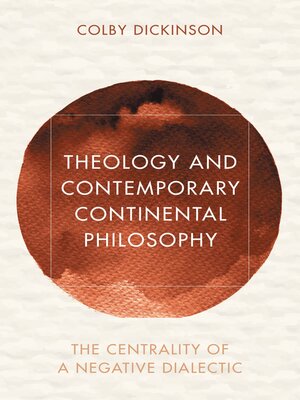Theology and Contemporary Continental Philosophy
ebook ∣ The Centrality of a Negative Dialectic · Reframing Continental Philosophy of Religion
By Colby Dickinson

Sign up to save your library
With an OverDrive account, you can save your favorite libraries for at-a-glance information about availability. Find out more about OverDrive accounts.
Find this title in Libby, the library reading app by OverDrive.



Search for a digital library with this title
Title found at these libraries:
| Library Name | Distance |
|---|---|
| Loading... |
This book aims to put modern continental philosophy, specifically the sub-fields of phenomenology, existentialism, hermeneutics, deconstruction, critical theory and genealogy, into conversation with the field of contemporary theology. Colby Dickinson demonstrates the way in which negative dialectics, or the negation of negation, may help us to grasp the thin (or non-existent) borders between continental philosophy and theology as the leading thinkers of both fields wrestle with their entrance into a new era. With the declining place of "the sacred" in the public sphere, we need to pay more attention than ever to how continental philosophy seems to be returning to distinctly theological roots.
Through a genealogical mapping of 20th-century continental philosophers, Dickinson highlights the ever-present Judeo-Christian roots of modern Western philosophical thought. Opposing categories such as immanence/transcendence, finitude/infinitude, universal/particular, subject/object, are at the center of works by thinkers such as Agamben, Marion, Vattimo, Levinas, Latour, Caputo and Adorno. This book argues that utilizing a negative dialectic allows us to move beyond the apparent fixation with dichotomies present within those fields and begin to perform both philosophy and theology anew.
Through a genealogical mapping of 20th-century continental philosophers, Dickinson highlights the ever-present Judeo-Christian roots of modern Western philosophical thought. Opposing categories such as immanence/transcendence, finitude/infinitude, universal/particular, subject/object, are at the center of works by thinkers such as Agamben, Marion, Vattimo, Levinas, Latour, Caputo and Adorno. This book argues that utilizing a negative dialectic allows us to move beyond the apparent fixation with dichotomies present within those fields and begin to perform both philosophy and theology anew.







